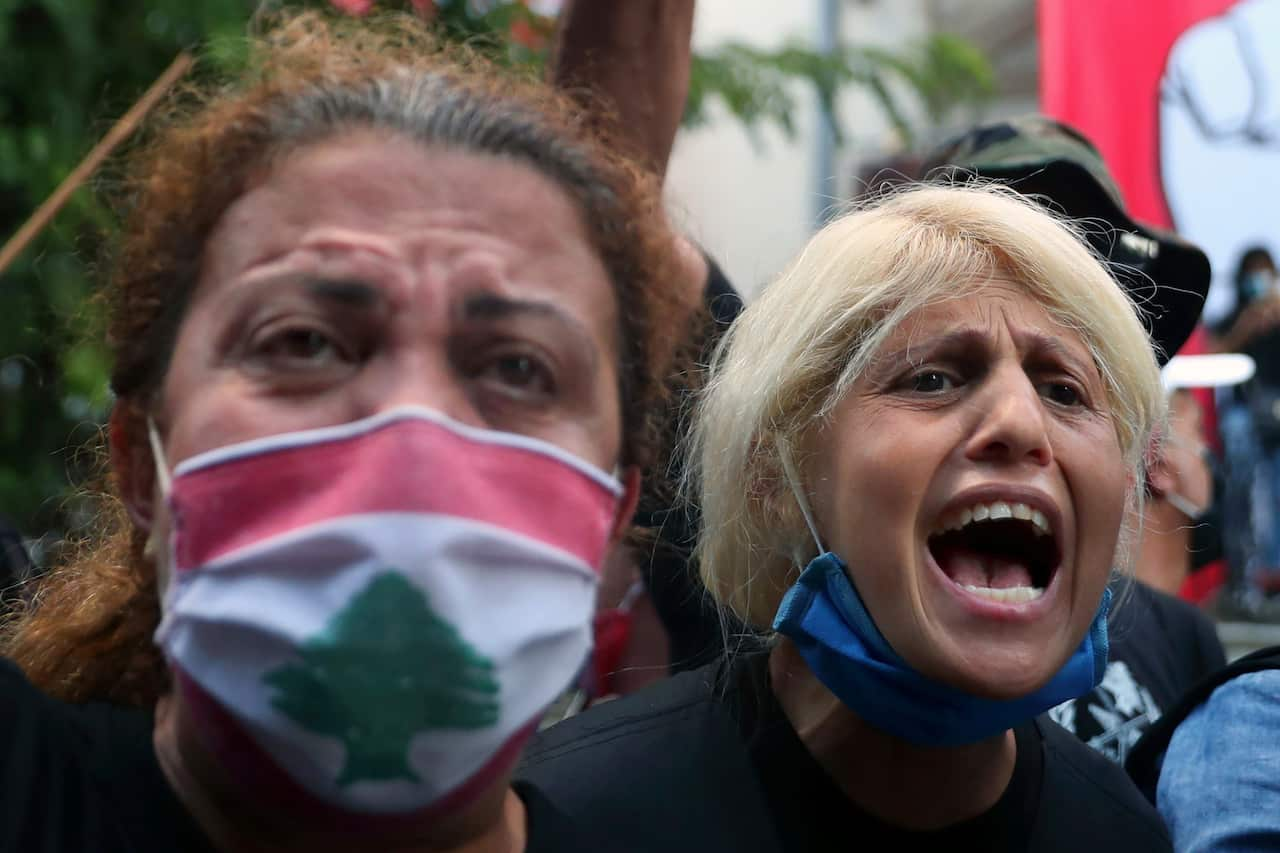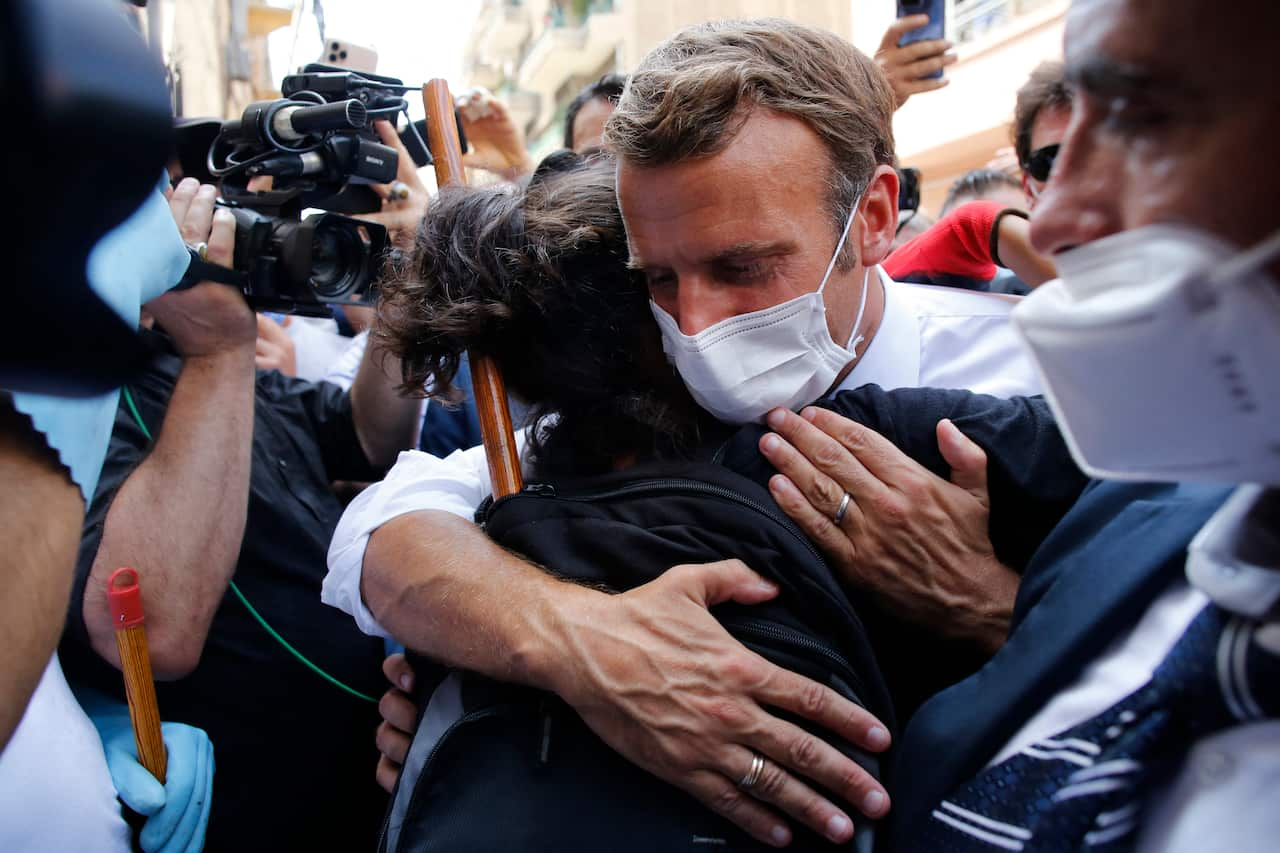Lebanon's information minister Manal Abdel Samad on Sunday became the first government minister to resign since since a deadly port blast killed more than 150 people and destroyed swathes of Beirut.
"After the enormous Beirut catastrophe, I announce my resignation from government," she said in a statement carried by local media, apologising to the Lebanese public for failing them.
The statement came alongside news French President Emmanuel Macron will on Sunday host Prime Minister Scott Morrison, US President Donald Trump and other representatives for a UN-backed virtual conference to drum up aid for Lebanon after the devastating Beirut blast.
The explosion was triggered by a fire in a port warehouse, where a huge shipment of hazardous ammonium nitrate, a chemical that can be used as a fertiliser or as an explosive, had languished for years, according to authorities.
The huge blast killed more than 150 people, wounded at least 6,000 and displaced more than 300,000 from their destroyed or damaged homes.
The revelation that the chemicals had languished for years like a ticking time-bomb in the heart of the capital has served as shocking proof to many Lebanese of the rot at the core of the state apparatus.
Demonstrators on Sunday called for renewed anti-government rallies after a night of angry protests saw them storm several ministries before they were expelled by the army. It was a new tactic for a protest movement that emerged last October to demand the removal of a political class long accused of being inept and corrupt.
It was a new tactic for a protest movement that emerged last October to demand the removal of a political class long accused of being inept and corrupt.

Anti-government protesters chant slogans inside the Lebanese foreign ministry in Beirut, Lebanon. Source: AP
Mr Macron on Thursday became the first world leader to visit Beirut after Tuesday's explosion and warned Lebanese leaders that while international aid would be forthcoming deep change was needed to resolve the country's problems.
The French president will be hoping that pledges made at the video summit, which begins at 1200 GMT (10pm AEST), will be translated into concrete donations and the funds spent transparently and for the right purpose. Speaking in Beirut after his visit on Thursday, Mr Macron said that the conference aimed to mobilise funding from Europe, the US and regional states to provide medicine, care, food, and housing.
Speaking in Beirut after his visit on Thursday, Mr Macron said that the conference aimed to mobilise funding from Europe, the US and regional states to provide medicine, care, food, and housing.

French President Emmanuel Macron hugs a resident as he visits a devastated street of Beirut, Lebanon. Source: ABACA
"We will also put in place clear and transparent governance so that all of this aid - whether it is French aid or international - is directly channelled to the people, to NGOs, to the teams in the field who need it, without any possible opacity or diversion," he said.
He said that the need for profound change meant "it is the time of responsibility for Lebanon today and its leaders" who required "a new pact with the Lebanese people in the coming weeks".
Prime Minister Hassan Diab said on Saturday that he would call for early elections.
Mr Trump, confirming his attendance at the conference, tweeted that "everyone wants to help!".
A French presidential source, who asked not to be named, said that the EU, Britain, China, Russia, Jordan and Egypt would all be represented, although it was not immediately clear at what level.
Israel, with whom Lebanon has no diplomatic relations, is not expected to take part.
Key Arab states in the Gulf, including Saudi Arabia, Qatar and the UAE are expected to take part but Iran, which wields huge influence in Lebanon through the Shiite group Hezbollah, had not shown a desire to participate, said the official.
Echoing Mr Macron's comments in Beirut, the official said that "it is necessary that this is not a blank cheque for the Lebanese government", adding that "it is not a question of how much is raised but how efficient it is".
Mr Macron, who will host the conference from his summer residence on the Mediterranean, had also underlined he would be returning to Lebanon on 1 September to check its progress.
Huge hole
The huge chemical explosion that hit Beirut's port left a 43-metre deep crater, said a security official on Sunday.
The blast on Tuesday, which was felt across the county and as far as the island of Cyprus, was recorded by the sensors of the American Institute of Geophysics (USGS) as having the power of a magnitude 3.3 earthquake.
"The explosion in the port left a crater 43 meters deep," the Lebanese security official told AFP, citing assessments by French experts working in the disaster area.
The crater is much larger than the one left by the enormous blast in 2005 that killed former prime minister Rafic Hariri, which measured 10 metres across and two metres deep, according to an international tribunal investigating his murder.
French rescue and police teams are among a much larger group of international emergency response specialists that has flooded into Lebanon to ease pressure on local authorities unable to cope with the disaster relief on their own.
Qatari, Russian and German rescuers are also working at the port blast site.
Share



